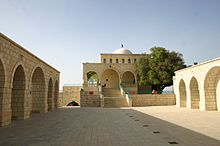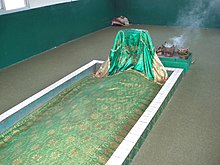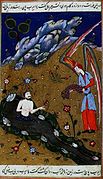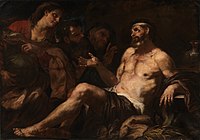|
Job (biblical figure)
Job (/dʒoʊb/ JOHB; Hebrew: אִיּוֹב 'Īyyōv; Greek: Ἰώβ Iṓb) is the central figure of the Book of Job in the Bible. In Islam, Job (Arabic: أيوب, romanized: ʾAyyūb) is also considered a prophet. Job is presented as a good and prosperous family man who is suddenly beset with horrendous disasters that take away all he holds dear—a scenario intended to test Job's faith in God. Struggling mightily to understand this situation, Job reflects on his despair but consistently remains devout. In the Hebrew Book of Job The Hebrew Book of Job is part of Ketuvim ("Writings") of the Hebrew Bible. Not much is known about Job based on the Masoretic Text. The characters in the Book of Job consist of Job, his wife, his three friends (Bildad, Eliphaz, and Zophar), a man named Elihu, God, and angels. It begins with an introduction to Job's character—he is described as a blessed man who lives righteously in the Land of Uz. The Lord's praise of Job prompts an angel with the title of "satan" ("Adversary") to suggest that Job served God simply because God protected him. God removes Job's protection and gives permission to the angel to take his wealth, his children, and his physical health (but not his life). Despite his difficult circumstances, he does not curse God, but rather curses the day of his birth. And although he anguishes over his plight, he stops short of accusing God of injustice. Job's miserable earthly condition is simply God's will. In the following, Job debates with three friends concerning his condition. They argue whether it was justified, and they debate solutions to his problems. Job ultimately condemns all their counsel, beliefs, and critiques of him as false. God then appears to Job and his friends out of a whirlwind. God rebukes the three friends and gives them instruction for the remission of sin, followed by Job being restored to an even better condition than his former wealthy state (Job 42:10–17). Job is blessed to have seven sons, and three daughters named Jemimah (which means "dove"), Keziah ("cinnamon"), and Keren-happuch ("horn of eye-makeup"). His daughters were said to be the most beautiful women in the land.[2] In the Greek Old Testament Book of Job The Septuagint, an ancient Greek translation of the Hebrew Old Testament, has a revised and updated final verse that claims Job's genealogy, asserting him to be a grandson of Esau and a ruler of Edom.
In other religious textsJudaism
Christianity
Mormonism
IslamThe Quran describes Job as a righteous servant of Allah, who was afflicted by suffering for a lengthy period of time. However, it clearly states that Job never lost faith in God and forever called to God in prayer, asking Him to remove his affliction: And [mention] Job, when he called to his Lord, "Indeed, adversity has touched me, and you are the Most Merciful of the merciful." — Quran, sura 21 (The Prophets), ayah 83 [1] Baháʼí
Job in Judaism A clear majority of rabbis saw Job as having in fact existed as a historically factual figure. According to a minority view, Job never existed.[9] In this view, Job was a literary creation by a prophet who used this form of writing to convey a divine message. On the other hand, the Talmud (in Tractate Baba Batra 15a–16b) goes to great lengths trying to ascertain when Job actually lived, citing many opinions and interpretations by the leading sages. Job is further mentioned in the Talmud as follows:[10]
Christian viewsChristianity accepts the Book of Job as canon in its Old Testament. In addition, Job is mentioned in the New Testament of the Christian Bible: the Epistle of James (James 5:11) paraphrases Job as an example of patience in suffering. Job's declaration, "I know that my redeemer liveth" (Job 19:25), is considered by some Christians to be a proto-Christian reference to Christ as the Redeemer, and is the basis of several Christian hymns, as well as the opening scene of Part III of Handel's Messiah. However, Jewish bible commentators and scholars point out that Job "insists on a divine hearing in his lifetime" (cf. Job 16:19–22).[18] Feast DaysHe is commemorated by the Lutheran Church–Missouri Synod in their Calendar of Saints on May 9, by the Roman Catholic Church on May 10, and by the Eastern Orthodox and Byzantine Catholic churches on May 6. He is also commemorated by the Armenian Apostolic Church on May 6 and December 26, and by the Coptic Orthodox Church on April 27 and August 29. The Armenian Apostolic Church commemorates Job along with John the Baptist on the Thursday after the third Sunday of the Feast of the Assumption.[19] Islamic views and Quranic accountIn the Qur'an, Job (Arabic: أيّوب, romanized: Ayyūb) is considered a prophet in Islam.[20] The narrative frame of Job's story in Islam is similar to the Hebrew Bible story but, in Islam, the emphasis is paid to Job remaining steadfast to God and there is no record of his despair, or mention of discussions with friends.[citation needed] Some Muslim commentators also spoke of Job as being the ancestor of the Romans.[21] Muslim literature also comments on Job's time and place of prophecy, saying that he came after Joseph in the prophetic series and that he preached to his own people rather than being sent to a specified community. Tradition further recounts that Job will be the leader of the group of "those who patiently endured" in Heaven. Local traditions regarding Job  There are at least two locations that claim to be the place of Job's ordeal, and at least three that claim to have his tomb. The Eyüp Sultan Mosque in Istanbul, Turkey, holds the tomb of Abu Ayyub al-Ansari, a companion of Muhammad, not the biblical/Qur'anic Job (Ayyub in Arabic, Eyüp in Turkish), though some locals tend to conflate the two.[citation needed] Modern PalestineIn Palestinian folk tradition,[citation needed] Job's place of trial is Al-Jura, or Al-Joura, a village outside the town of Al-Majdal (today's Ashkelon, Israel). It was there God rewarded him with a fountain of youth that removed whatever illnesses he had, and gave him back his youth. To the northwest of the depopulated Palestinian village of Dayr Ayyub is an area which, according to the village belief, contained the tomb of the prophet Ayyub, the biblical Job.[22] In the area of Tabgha (Greek: Heptapegon), on the shore of the Sea of Galilee, a few sites are associated by local tradition with the life of Ayyub. A small grotto near the base of what is known to Christians as the Mount of Beatitudes, or Mount Eremos, is known as Mghraret Ayub ("Job's Cave").[citation needed] Two of the towers built in the Byzantine period to collect the water of the Heptapegon springs are named in Arabic Tannur Ayub ("Job's Kiln") and Hammam Ayyub ("Job's Bath").[23][24] Hammam Ayyub was initially called "the Leper's Bath", but the leper was later identified with Job; the nearby spring, now a waterfall, is known as Ain Ayub, "Job's Spring".[25][26] Hauran, SyriaThe town of al-Shaykh Saad in the Hauran region in Syria has been associated with Job since at least the 4th-century AD. Karnein was mentioned in Eusebius' Onomasticon as a town of Bashan that was said to be the location of the house of Job. Egeria the pilgrim relates that a church was built over the place in March or February 384 AD, and that the place was known as the "town of Job", or "civitas Job". According to Egeria's account the body of Job was laid in a stone coffin below the altar.[27] According to tradition, Hammam Ayyub is a fountain in the town where Job washed himself when he was sick, and is reputed to have healing powers.[28] Another holy artifact in the town is the "Rock of Job", known in local folklore as the place where he sat when he was afflicted with the disease.[29] Urfa, TurkeyThe city of Urfa (ancient Adma', later Edessa) in the Şanlıurfa Province, or Harran region of southeastern Turkey, also claims to be the location at which Job underwent his ordeal in a cave. The location boasts an Ottoman-style mosque and madrasa that runs as shops today. A well exists within the complex, said to be the one formed when he struck the ground with his foot as described in the Quran. The water is considered to be miraculously curing. The whole complex underwent recent restoration.[30] The tomb of Job is located outside the city of Urfa.[citation needed] OmanThe Tomb of Job is also said to be situated in Jabal Qarah outside the city of Salalah in southern Oman.[31] El-Chouf mountains, LebanonAdditionally, the Druze community also maintains a shrine for the Prophet Job in Niha village in the Chouf mountains of Lebanon.[32][33] This shrine is said to be the place where Job was healed from his ailments after his wife carried his frail body up the steep mountain in a basket so he dies up there. Instead, he was healed and given an even larger wealth. Ayodhya, IndiaIn a 16th-century Mughal document, Ain-i-Akbari, there is mention of a tomb, in Ayodhya, commonly believed to be the resting place of the Prophet Job.[34][35] The tomb of the Prophet Job in Ayodhya is also mentioned in the work India of Aurangzeb of Jadunath Sarkar.[35] Gallery
See also
References
External linksWikimedia Commons has media related to Job.
|
||||||||||||||||||







